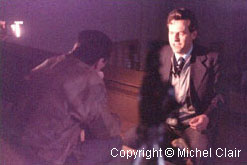László Tőkés
László Tőkés is from the large Hungarian minority in Romania (1.5 million people), located mainly in the western part of the country known as Transylvania. Like his father, László Tőkés became a protestant minister in the late 1970s, and first caught the eye of authorities in the early 1980s when it was revealed that he wrote for the Hungarian-language samizdat publication "Ellenpontok" ("Counterpoints") which criticized the dictatorship of Nicolae Ceausescu.
|
Réjean
Roy interviews László Tőkés during a secret mission in March of 1989. The broadcast of that interview forced Romanian dictator Nicolae Ceausescu's hand. |
Tőkés was now being carefully watched by the Securitate. He eventually lost his job as minister after speaking out against the poor state of affairs of the church, including the lack of bibles. He was unemployed for two years, but after increasing criticism from the West the authorities relented and appointed Tőkés assistant minister under Leo Peuker at the Hungarian Protestant (Reformed) Church in Timisoara in June of 1986. Peuker died that December and Tőkés automatically became the head minister.
Within months Tőkés built up his church from a mere 30 members of the congregation showing up to service to more than 400. He also used his pulpit to criticize the harsh conditions in the country, such as food and power shortages, and the discriminatory treatment of minorities, such as the closing down or amalgamation of schools in the Hungarian language. Tőkés also severely criticized Ceausescu's village destruction plan that would have eliminated thousands of villages and transferred the inhabitants to towns and cities. Villages were the last stronghold of culture for the Hungarian minority during the Ceausescu reign. He also actively gave interviews to western media - if they could reach him. In so doing, Tőkés became the country's biggest dissident. He also devised ingenious ways of getting messages out to the West. That all culminated in 1989 when he gave a secret TV interview to two French-Canadians. After outfoxing the Romanian Secret Police - the Securitate - the tapes were smuggled out and first broadcast in July in Hungary, which people in western Romania were able to watch.
Tokes calls the airing of that "the turning point". Because of that interview Tőkés was given a series of ultimatums by authorities to leave the church which culminated with the order to evict him on December 15 of that year.
Tőkés refused, his congregation came out to protect him from approaching military and Securitate units, and the Romanian Revolution began, quickly spreading across the country.
About 1,100 people died.
Tőkés survived, despite being arrested, interrogated and beaten. But the revolution succeeded and on December 25 Ceausescu was executed.
Tőkés then went on to become actively involved in politics, primarily concerning himself with the state of the Hungarian minority in Romania. He also became Bishop.
And in November of 2007 he was elected to the European Parliament.






